(^oops, there was an error in the audio, I said 55 years not 59, apologies!)
Hey y’all. I hope breath is finding you, I hope the sun is warming you, wherever you are. I’m picking up the threads from last week to bring closure to this little series, weaving this tapestry into an announcement I’m excited to share with y’all. Read along to hear the how and the why.
I always love hearing from you, if you feel moved.
“Can we not find it in ourselves to belong to an ancient civilization instead of to just a recent nation? To love a land instead of just patrolling a territory?”
- Arundhati Roy
Last week, I spoke about the co-opting of the American Revolution, about how the rainbow coalition - the many headed hydra - fighting to overthrow empire through egalitarianism, was ultimately manipulated by this nation’s aristocrats to secure their new-world empire. As a quick aside, I said I would speak about Hercules again today, but unfortunately I’ll have to bring in that myth another time to keep this piece contained. With that, I’ll continue and expand this story by bringing in the young Frenchman I told y’all about a few weeks ago. Alexis de Tocqueville visited America to study the prison system, and during his time here he captured prescient field notes he published in his prophetic text “Democracy in America”, in 1835, when America was just 59 years old (apologies the audio says 55). Through his observations, Tocqueville predicted that America would kill itself over the two critical contradictions it embedded into its democracy, as discussed last week: racism and despotism.
I learned Tocqueville best through two great writers, Joel Olsen and John Keane. In The Abolition of White Democracy, Joel Olsen wrote:
“Tocqueville argues that there are two possibilities regarding the fate of whites and Blacks, who ‘face each other like two foreign peoples on the same soil.’ Either they ‘mingle completely’ or ‘they must part.’ Tocqueville does not believe the first option is a real possibility. As long as America remains a democracy, no one, he insists, would dare attempt to bring about social equality. Indeed, ‘the freer the whites in America are, the more they will seek to isolate themselves,’ from Black and Native peoples. It is not just that race is the one terrain where the march of equality will not tramp, he implies; it is that equality and white supremacy are symbiotic.” …white people saw no necessary contradiction between equality and white domination.
And on despotism, John Keane summarized his assertions poignantly:
“Tocqueville was among the first political writers to spot that a middle class gripped by selfish individualism and live-for-today materialism was prone to political promiscuity. A class of so-called citizens ‘constantly circling for petty pleasures’ could easily be persuaded to sacrifice their freedoms by embracing an ‘immense protective power’ that treats its subjects as ‘perpetual children’, as a ‘flock of timid animals’ in need of a shepherd… (Alexis speaking on that patriarchal savior complex!) Feeding upon the fetish of private material consumption and the public apathy of citizens no longer much interested in politics, despotism is a new type of popular domination: a disciplinary power that treats its citizens as subjects, wins their support, and robs them of their wish to participate in government, or to pay attention to the common good.”
You can see why I love this man so. 187 years ago, Tocqueville tried to alert the world that America was a doomed democratic experiment due to its perpetuation of a race+class hierarchy. As we all know too well, America’s PR team has crushed that critique exquisitely. The mythology has trumped the truth and only become more entrenched. Two years ago, Isabel Wilkerson said what needed to be said plainly in the New York Times: America has a caste system. An excerpt from her writing:
“While the requirements to qualify as white have changed over the centuries, the fact of a dominant caste has remained constant from its inception — whoever fit the definition of white, at whatever point in history, was granted the legal rights and privileges of the dominant caste. Caste entitlement is… knowing without thinking that you are one up from another based on rules not set down on paper but reinforced in commercials, television shows and billboards, from boardrooms to newsrooms to gated subdivisions… This is the blindsiding banality of caste.”
Wilkerson wove in the work of Eric Fromm, psychoanalyst and social theorist, to explain that social hierarchies create a national narcissistic complex through the “seductive power of nationalistic appeals to the anxieties of ordinary people.” This is how the founding fathers did it. How Hitler did it. How Trump did it. Creating patriots by playing on fear. With all of this in mind, we can see how our increasing pivot to fascism is the downfall Tocqueville predicted almost 200 years ago.
As I sit with the heavy truths of America, from the seeds sparked in Europe to today, I turn back to James Baldwin, who somehow loved America, who, in fact, credited this love of America for his commitment to evolving this place through his critique. I think of bell hooks, who taught us so much about love, who said “renewal is an act of self-love” and “love is the will to extend one's self for the purpose of nurturing one's own or another's spiritual growth.” I think about what it means to love this nation, this narcissist.
James Baldwin and bell hooks and Martin Luther King Jr and so many of America’s bravest critics gave us the love ethics we need to combat national narcissism and find healing. They loved America so much that they moved to the center of this spiritual fire. They spoke of courageous, unmasking love, interdependent not co-dependent love, revolutionary, radical love, not toxic, cheap substitutes.
James Baldwin said:
“Love takes off the masks that we fear we cannot live without and know we cannot live within.”
What kind of love is possible amongst us, we the future ancestors with this nation of our inheritance? What is our response-ability to those who loved this nation into deeper spiritual evolution? Could America be un-done, like racism, like capitalism, to renew the sacred civilizations and love the lands that thrived here long before this nation destroyed them?
I realize that I am tormented by America, in part, because I know that refuge for my heritage was only narrowly secured, that we only fled here out of desperation, and that the price of the ticket1 was devastatingly high. In Europe’s “nation’s”, our faith was a death sentence that shoved us to the bottom of the hierarchy where Jews were deemed “life unworthy of life”. But here, the survival ladder looked a little different, and we climbed up. The purity of our paleness outweighed the impurity of our Jewishness, and this privilege allowed us to play the right cards and open the right doors. This is how white supremacy survives: death or assimilation of everyone in its path.
I’ve discussed many massive themes in these two posts, and I want to end with the personal, because at a deep level I agree with friend and teacher brontë velez who says we must undo the violence in ourselves if we expect it to be undone around us. As within, so without.
Building a relationship of love with this nation has been a long journey of intimate unraveling and re-weaving. Last summer, my uncle oriented me to years of painstaking research he has invested into documenting my paternal heritage. As we clicked our way through the family tree, I saw persecution up-root and re-root us over and over again as my family fled anti-Semitic pogroms across Lithuania and Poland, never anywhere long, until Germany allowed two generations to settle. Then Germany itself became the epicenter of annihilation. I saw “Jude” stars as speckled leaves hanging off the branches - the profile pictures he used to indicate everyone who was killed in various concentration camps. My grief poured through my pained expression. My aunt, witnessing me through Zoom, said “we were the lucky ones.”
I knew some of this, but not all of this, and it overwhelmed my heart to see it flood my screen. The lives decimated by this insane world-making and un-making of white supremacy. I look at my family today, and I see the broken-hearted weariness threaded into us, still shuddering in the long night as we cling to whatever mechanisms help us feel safe as we carry lifetimes of trauma, even as tragedies still go on. But I also see the fierce resilience in every step forward, and the dedication to transmute this suffering into freedom.
This devotion of my lifetime is a tribute to my ancestors – the ones who held the prayer in their hearts that said, if not for me, then for those who are yet to be.
“Can we not find it in ourselves to belong to an ancient civilization instead of to just a recent nation? To love a land instead of just patrolling a territory?”
I look back to Arundhati Roy’s words. America tangles into me. She helps me understand that as I release the knot of this nation, I knit myself back into sacred civilization. I nourish deep relationships, not only with the lands beneath my feet, but with the lands of many elsewheres that my lineage once called home. And ultimately, I find my way back into belonging with the Earth. I find strength in how many of us across the world tend to the unyielding fire of solidarity against oppression, unified by shared devotion to our thrival through liberation. We are many.
On that note, this labor of love has shaped itself into a course, weaving together love of land and lineage and the restoration of the sacred, and I am honored and humbled to share with you that I will be offering it again this year. Cultivating Culture is a journey of ancestral repair, reclamation, and renewal to find our paths and roots outside of whiteness to bloom brighter futures. Learn more and express interest here: Cultivating Culture: Ceremonial Inquiry, Collective Sense-Making, and Creative Expression
Alright y’all, thanks so much for tuning into this two-part piece. I’m excited to shift gears next week. Til next time, I hope to engage with you all in the comments or wherever else our paths might cross.
With love,
Rachel

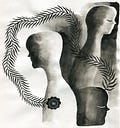




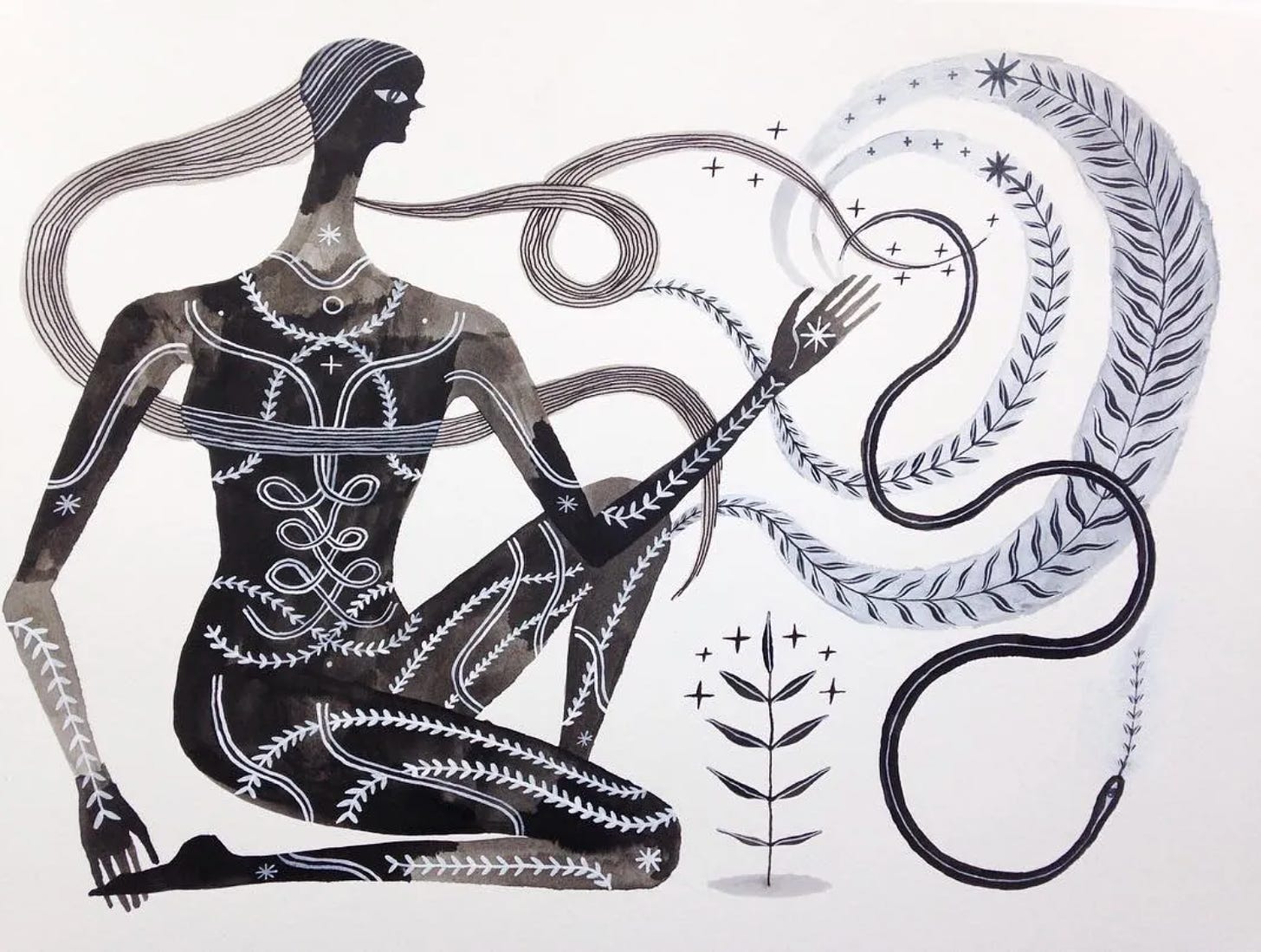
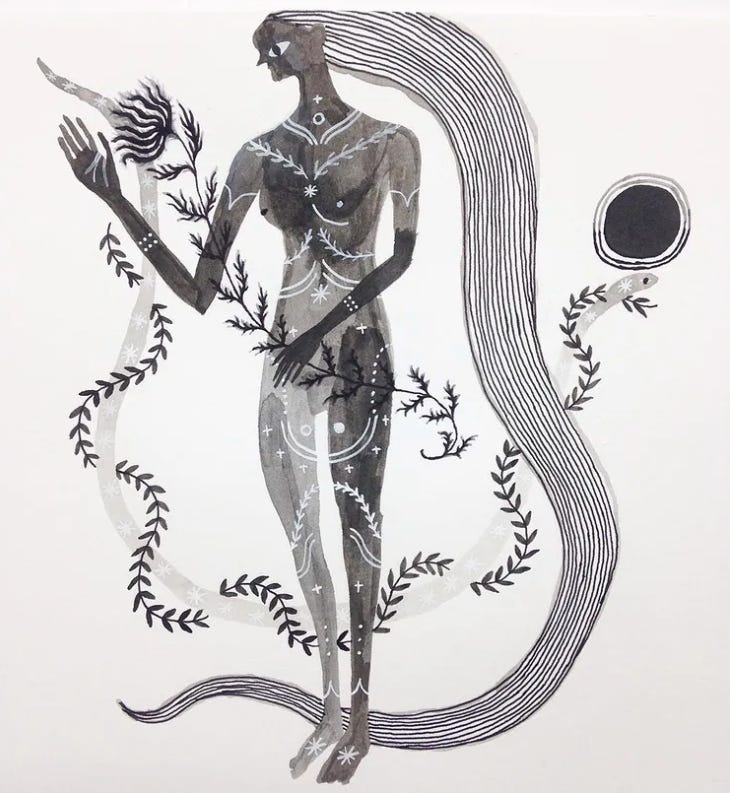






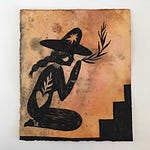

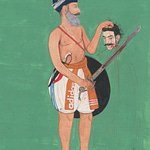


America, the narcissist (part 2)